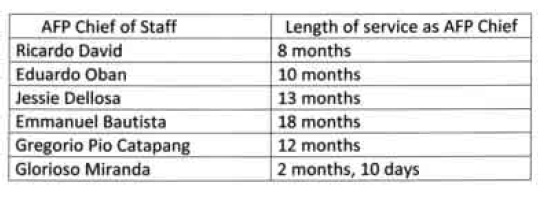Six years in office, seven AFP chiefs
LAST FRIDAY, President Aquino installed his seventh and last AFP chief of staff in the person of Lt. Gen. Glorioso Miranda, the current vice chief of staff of the armed forces. He will serve in an acting capacity until June 30, when the incoming commander in chief may decide to keep him on the job or appoint a new AFP chief. General Miranda and his PMA Class 1983 batch mate, Lt. Gen. Eduardo Año, will be retiring in October of next year.
The appointment of General Miranda completes the record of P-Noy insofar as the top leadership of the AFP is concerned.
The “revolving door” situation that plagues our armed forces, holds true not just for the top AFP post but also for service commanders and heads of area commands, like the Western Mindanao Command that includes Basilan, Zamboanga and Sulu where most of the fighting takes place. If we look closely at the roster of these units, it becomes noticeable that an important part of the problems they face is the “revolving door” concept of leadership. There are exceptions now and then but, most often, a tour of duty is short-term, ranging from 12 to 14 months.
In any organization, military or civilian, no substantial long-lasting reforms that truly bring about transformation can succeed under a short-term leadership. Whatever changes come about from such management policies are mostly cosmetic in nature.
Among our Asean neighbors, we must be an object not
only of pity, possibly, even disdain—we are the weakest force in the region—but also of curiosity. They must be wondering why we replace our military leaders so often that there is virtually no time at all to develop close and meaningful relationships between counterparts. This, at a time when we face common problems and need greater efforts at cooperation and solidarity.
There is an interesting side story to the present “revolving door” scenario that is not known to our people but one that did not escape notice among members of the armed forces.
A few months ago, the AFP vice chief of staff was Marine Lt. Gen. Romeo Tanalgo who earlier served as the commandant of the Philippine Marines. At that time, General Miranda was Northern Luzon commander (Nolcom). Last month the rigodon started with Tanalgo moving down or laterally (depending on how you view these positions) from vice chief of staff, the No. 2 post in the AFP, to Nolcom commander. General Miranda was moved to GHQ to assume the position of vice chief of staff. If the status quo had been maintained, Tanalgo would have had a shot at the chief of staff position.

The change of command ceremony was an opportunity for the President to express his feelings for the troops, especially in the light of the recent Basilan losses. One would think he would deliver an inspirational and uplifting message, one that would show his empathy for the men in uniform. The seven-minute speech, described as the shortest delivered by the commander in chief, was a letdown.
Consider how President Cory Aquino addressed the troops at the end of her term of office: “Goodbye, my soldiers.” They were her soldiers and they defended her against every and all threats to her presidency even at the terrible cost of fighting their fellow soldiers. It was an emotional
experience that raised a lump in many throats.
* * *
In 1995 Robert Timberg, a US Naval Academy graduate and award-winning journalist, wrote a bestseller, “The Nightingale’s Song.” It dwelt on the lives of five Annapolis graduates: John Poindexter, Robert McFarlane, Oliver North, John McCain and James Webb.
Briefly. John Poindexter and John McCain belong to the Naval Academy Class of 1958. Poindexter served as
brigade commander and graduated No. 1 in his class.
He would become national security adviser under President Ronald Reagan.
McCain graduated fifth from the bottom of his class. After five years in a Vietnam POW camp, he would become a US senator and later a presidential candidate. He was defeated by Barack Obama but continues to serve in the Senate.
Robert McFarlane, Class of 1959, would also serve as national security adviser under President Reagan.
James Webb and Oliver North both belong to the Class of 1968. As midshipmen they would dispute the 145-pound Brigade Boxing Championship with North winning by unanimous decision.
Outside of the academy, Oliver North would end up as the central figure in the Iran Contra scandal (a secret arms-for-hostage operation); and he used his popularity for an unsuccessful Senate run. James Webb would become a highly-decorated Marine infantry officer but his fame rested on his writings, not his government service. His novel, “Fields of Fire,” about a Marine rifle platoon in Vietnam, became a widely acclaimed bestseller.
Webb would serve as secretary of the navy for a brief period under Reagan. At age 42 he took his oath of office as the 66th secretary of the navy, the first Naval Academy graduate to serve in this position. A few months after assuming office, he spoke before the Brigade of Midshipmen at Annapolis. He told the assembly, “Throughout your life, you will judge yourself against two harsh and often painful standards. They were, ‘Did you get the job done? How many people did it cost?’”
While it is always a source of deep satisfaction to receive recognition from prestigious organizations for good governance initiatives, let us not forget that in the ultimate analysis it is how the AFP measures up to the standards pointed out by James Webb that determines its effectiveness as a fighting force.
• Did you get the job done?
• How many people did it cost?




















